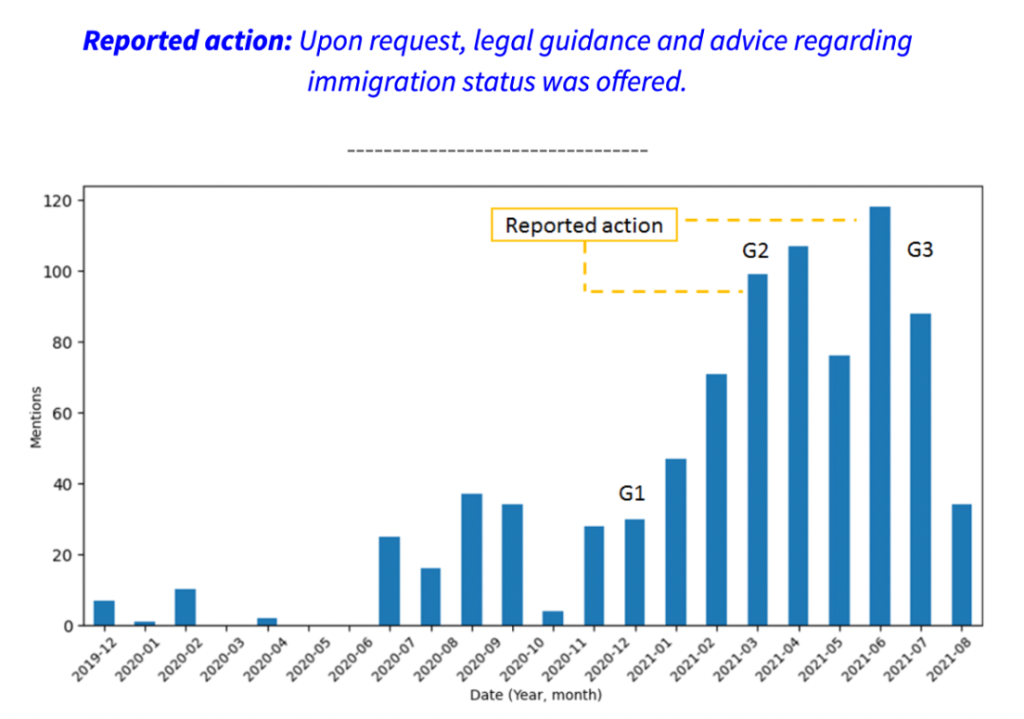
Greetings evaluators, my name is Melisa Sanmiguel, and I am the information lead at Kuja Kuja, a real-time feedback and accountability system that amplifies communities’ ideas and empowers active participation in the design and implementation of humanitarian services.
Since 2016, Kuja Kuja has actively listened to over 2.2 million members of vulnerable communities in seven countries. We have processed all of these conversations to produce dashboards and baseline data that is helping humanitarian organizations around the world evaluate and improve the services they offer to people affected by crises. Our methodology has demonstrated the incredible amount of innovative ideas that communities have, and how eager they are to share those insights with organizations and government entities.
Take, for example, the case of Venezuelan migrants trying to make better lives in Colombia. Since 2015, over 2.5 million Venezuelans have crossed into Colombia, causing a humanitarian crisis in which the access to basic services, such as food, education, and health assistance, is limited. Entire families are arriving in Colombia to pursue a better life, fleeing from poverty and insecurity, a situation aggravated by the COVID-19 pandemic.
In the past two years, Kuja Kuja worked with the American Red Cross (ARC) and the Colombian Red Cross (CRC) to collect feedback from these migrant communities and integrate it into their decision-making process. Originally, we collected migrant feedback to help the ARC and CRC evaluate health programs in Arauca, one of the regions with the most difficult challenges in terms of irregular migration. The ARC and CRC recognized that to truly assess how well their programs were working in Arauca, they needed to hear from the migrants using those services. As we analyzed the evaluation data, we found patterns that pointed to opportunities for the Red Cross to innovate.
In Arauca, the CRC started working with migrants to implement their ideas. Migrants themselves became active participants in the legal aid program. The organization took action providing legal counseling services, and afterwards, migrants requested printed information and records of the events, amplifying CRC’s work by spreading the information themselves within their communities.
| Ideas group | Summary ideas |
| G1 | “General talks for those who need guidance on how to obtain legal permits would be beneficial to many.” |
| G2 | “We would like to have a person available to provide us with legal information and access to other health services, this would be ideal as a staff member.” |
| G3 | “Provide information through brochures on the steps to follow to access the Migratory Statute as mentioned by the officer.” |
Kuja Kuja created a dashboard to help the CRC team track how often they were now able to respond to migrant requests for legal advice. A specific evaluation turned into a conversation with migrants in the region that progressively became concrete action towards meeting their needs.

This is the power that listening, combined with sophisticated data science, has to reshape evaluation. Kuja Kuja’s experience in Colombia shows that promoting direct and open conversations with the communities as part of an evaluation is an effective way to dignify the final beneficiaries, and make them active subjects in the organization’s decision-making process. Simultaneously, organizations learn to add communities’ experiences and knowledge to the usual academic and professional standards in the design and implementation of humanitarian programs.
Hot Tips
- Kuja Kuja’s approach on feedback emerged to strengthen the values of the humanitarian sector. Our methodology is deeply related to the Core Humanitarian Standards, which emphasize the importance of communication, participation, and engagement with communities in humanitarian response.
- Repeated consultations with communities allows organizations to not only implement suggested approaches, but to tailor them for higher impact and participation. Our partner Alight started by listening to Ukrainians’ desired destinations in Poland in order to develop a resource that guides refugees to Recommended Cities across the country.
- When organizations use external tools to document responses (actions) on evaluation insights, those documented actions can lead to even further evidence of impact.

Do you have questions, concerns, kudos, or content to extend this aea365 contribution? Please add them in the comments section for this post on the aea365 webpage so that we may enrich our community of practice. Would you like to submit an aea365 Tip? Please send a note of interest to aea365@eval.org. aea365 is sponsored by the American Evaluation Association and provides a Tip-a-Day by and for evaluators.
